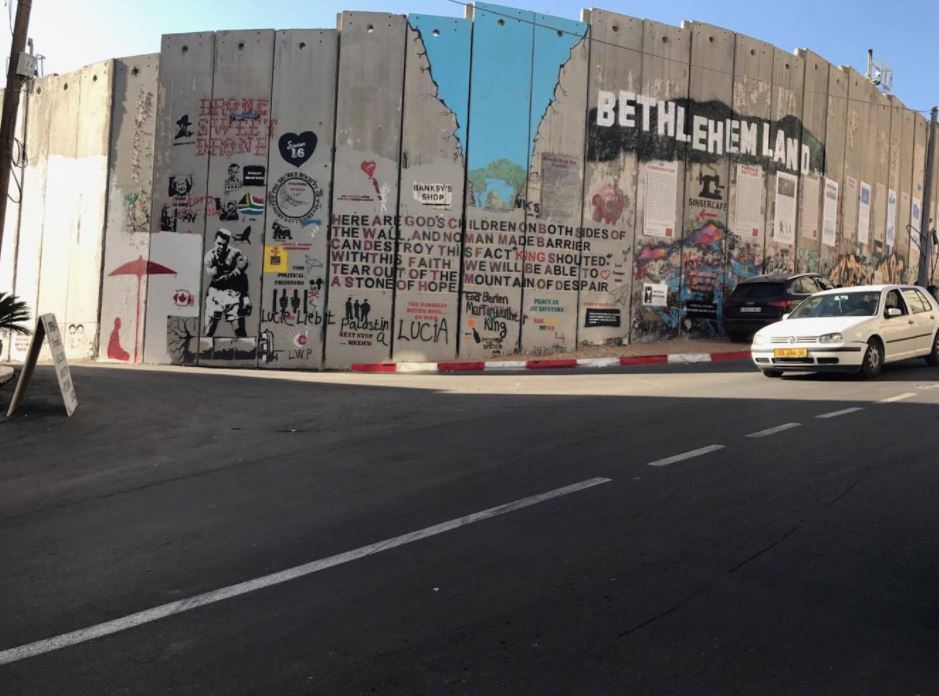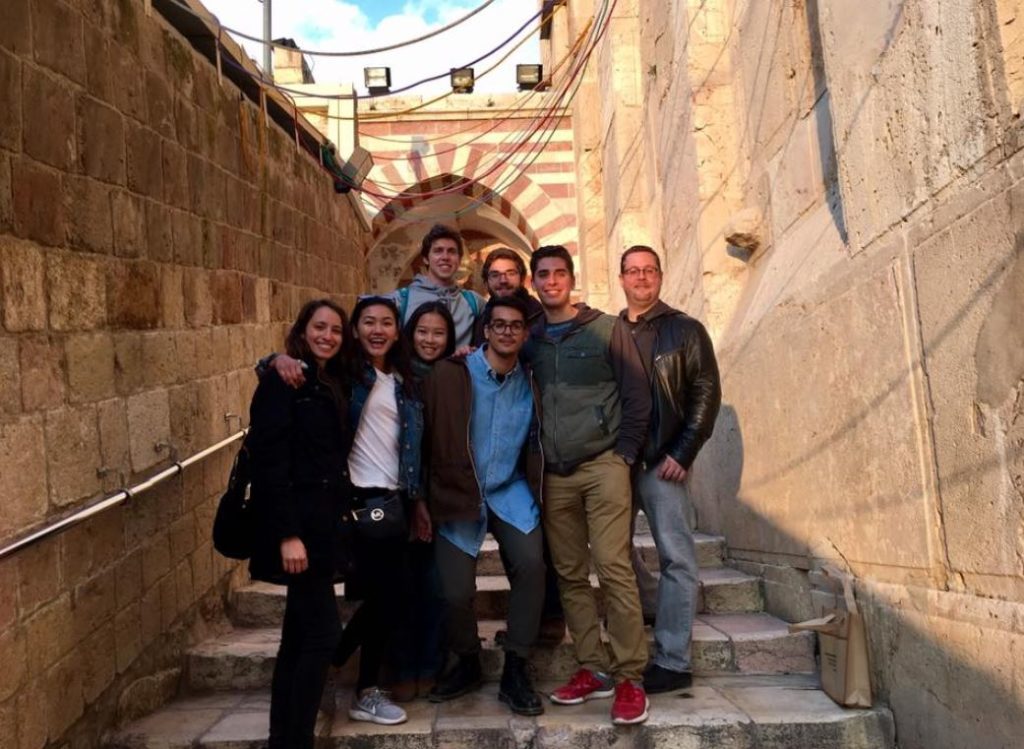Flora Tang, Senior Anchor Intern
To get to Sunday Mass in the holy city of Jerusalem, where I studied abroad last spring, is a walk not for the fainthearted. I walked down a rocky hill, through a gate, on a dusty road, past a few dozen heavily-armed Israeli soldiers, through a military checkpoint that cuts through a 25-foot tall concrete wall, enter the city of Bethlehem, walk along said 25-foot tall cement walls for 20 minutes, and then down the sometimes-nonexistent sidewalk of a busy main street for another 40 minutes before reaching the Church of the Nativity where Arabic-speaking Palestinian Catholics gather for Mass. Yep, just a slightly longer walk than the whooping four flights of stairs I must take from my dorm room to Mass in the chapel of Breen Phillips Hall.

Living beside a Separation Wall and crossing it on the way to Mass is disheartening, to say the least. Even the Church of the Nativity itself bears the marks of bullet holes and repaired statues once shattered by bombs. The Separation Wall and all the everyday division, violence, and injustice in Israel-Palestine became a living reminder of the age-old problem of evil, of violence in the world, and of injustices committed in the name of religion. The walk to Mass every Sunday seems to shatter the very hope and certainty that my faith has always given me. What helps is that at the end of this long walk, at least there is Mass, where I can find just enough peace in the Eucharist. What doesn’t help, however, is that the Mass is entirely in Arabic, a language in which I could barely carry a conversation beyond “how are you,” let alone understand a single word of the readings or homily.
“But there are two words that I do understand at Arabic Mass!” I would sometimes joke. And those would be the only times when I can (finally!) participate with full heart and voice.
Salaam. “Peace.” A common greeting used by Arabic speakers of all faiths, a word I learned before even learning the Arabic word for “hello.” When I hear the priest repeat the word salaam for the third time in a sentence shortly after the Eucharistic Prayer, I would know that it’s my cue to turn to my neighbors and offer my “salaam” to them.
And, unsurprisingly, “Amen,” a word pronounced more or less the same in most languages. Well, technically, there’s only one “amen” that I know when to say. Whereas the rest of the “amen’s” during Mass erupt at completely unexpected times since I don’t understand any of the priest’s words preceding them, I would- almost out of habit- utter Amen before the Priest places the Eucharist in my palms in the communion line.
Soon enough, I came to realize that even as I do not understand the readings, the homily, or the rest of Mass, these two words alone perhaps have the power to illuminate the essence of my faith in a land -and in a world- marked by violence and injustice. Perhaps God does speak to my infuriated and hopeless self, even in a language I do not understand.
Peace. God’s call.
Just as we are called to offer one another the sign of peace during Mass, we are called to bring forth peace in the lives of others and in the world. As Jesus Himself said, “blessed are the peacemakers.” The violence and injustice I see in Israel-Palestine or in our own home communities are not reasons to be hopeless, but reasons to more actively live out Christ’s call to us to be peacemakers amidst this violence and amidst all forms of structural violence.

Yet this peace that we are called to bring is not a pretense of peace that can be easily achieved by hiding away from violence in our own comfort zones. Nor is it through constructing massive walls that feign peace by dividing and silencing the other. “Peace is not the silent result of violent repression,” Blessed Oscar Romero writes. Christ’s peace, which differs from human peace, is a peace built on the foundations of justice, mercy, and love. And we, as Christians, are called to be agents of this peace.
Amen. Our response.
Uttering “amen” before the Body of Christ is not a simple word, but a weighty, radical response to God’s radical love for us. When we say amen, we make the radical choice to recognizing Christ’s own body, broken for us out of His radical love, under the appearance of a little white host before our eyes. The same “amen” also calls us to recommit ourselves to living out a Christ-like radical love by recognizing and healing the many broken “bodies of Christ” under the appearance of those in the world who are most afflicted, like Christ Himself on the Cross, by violence, rejection, pain, and brokenness. To say “amen” and kneel before the Body of Christ in the Eucharist, and then to go out into the world and ignore the many broken and rejected “Christ’s” among us is the opposite of what the very same Christ demands of us.
Up to this day, I still do not understand why God allows for violence, for humans to divide one another and to commit injustice against one another, or why violence is often committed in the name of religion itself. I still do not understand why a 25-feet tall wall stands between Bethlehem, the place of Jesus’ birth, and Jerusalem, the place of His resurrection. But just like the only two words I do understand amidst all the incomprehension at Arabic Mass, the only thing of which I am certain is Jesus’ eternal demand for us in this broken world to be peacemakers through living out justice and mercy, and to radically love the most wounded “bodies of Christ” as a response to His Eucharistic love for us– whether on campus, in our home communities, or in other corners of the world.